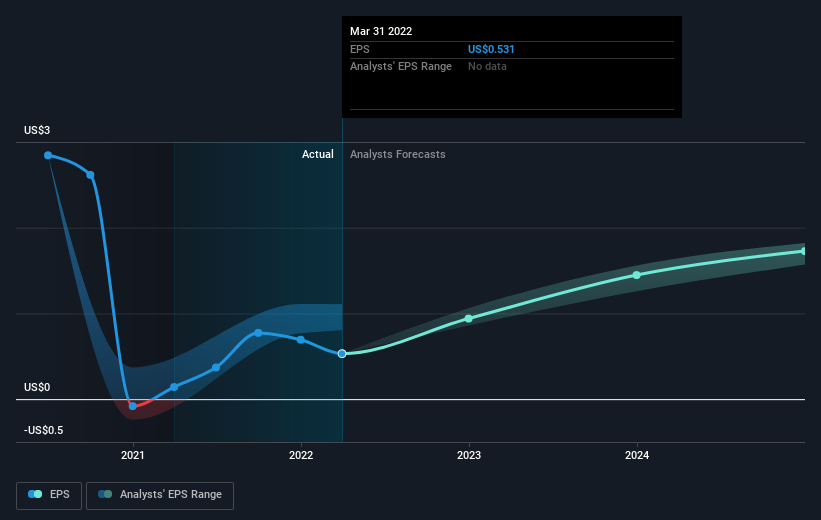The total return for Boston Scientific (NYSE:BSX) investors has risen faster than earnings growth over the last five years
Boston Scientific Corporation (NYSE:BSX) shareholders might be concerned after seeing the share price drop 11% in the last month. But the silver lining is the stock is up over five years. However we are not very impressed because the share price is only up 48%, less than the market return of 79%.
Although Boston Scientific has shed US$4.6b from its market cap this week, let's take a look at its longer term fundamental trends and see if they've driven returns.
Check out our latest analysis for Boston Scientific
While markets are a powerful pricing mechanism, share prices reflect investor sentiment, not just underlying business performance. By comparing earnings per share (EPS) and share price changes over time, we can get a feel for how investor attitudes to a company have morphed over time.
Over half a decade, Boston Scientific managed to grow its earnings per share at 11% a year. This EPS growth is higher than the 8% average annual increase in the share price. So it seems the market isn't so enthusiastic about the stock these days. Having said that, the market is still optimistic, given the P/E ratio of 73.35.
You can see how EPS has changed over time in the image below (click on the chart to see the exact values).
We like that insiders have been buying shares in the last twelve months. Having said that, most people consider earnings and revenue growth trends to be a more meaningful guide to the business. Before buying or selling a stock, we always recommend a close examination of historic growth trends, available here..
A Different Perspective
Although it hurts that Boston Scientific returned a loss of 6.8% in the last twelve months, the broader market was actually worse, returning a loss of 9.4%. Of course, the long term returns are far more important and the good news is that over five years, the stock has returned 8% for each year. In the best case scenario the last year is just a temporary blip on the journey to a brighter future. It's always interesting to track share price performance over the longer term. But to understand Boston Scientific better, we need to consider many other factors. Like risks, for instance. Every company has them, and we've spotted 2 warning signs for Boston Scientific (of which 1 shouldn't be ignored!) you should know about.
Boston Scientific is not the only stock insiders are buying. So take a peek at this free list of growing companies with insider buying.
Please note, the market returns quoted in this article reflect the market weighted average returns of stocks that currently trade on US exchanges.
Have feedback on this article? Concerned about the content? Get in touch with us directly. Alternatively, email editorial-team (at) simplywallst.com.
This article by Simply Wall St is general in nature. We provide commentary based on historical data and analyst forecasts only using an unbiased methodology and our articles are not intended to be financial advice. It does not constitute a recommendation to buy or sell any stock, and does not take account of your objectives, or your financial situation. We aim to bring you long-term focused analysis driven by fundamental data. Note that our analysis may not factor in the latest price-sensitive company announcements or qualitative material. Simply Wall St has no position in any stocks mentioned.

 Yahoo Finance
Yahoo Finance 
